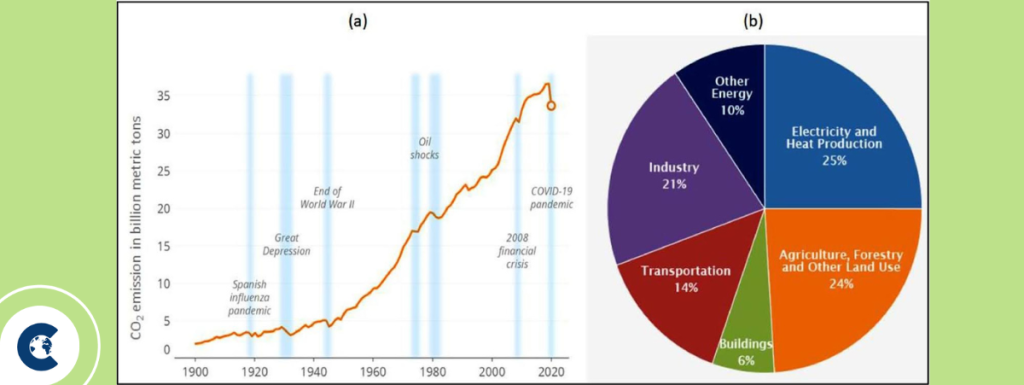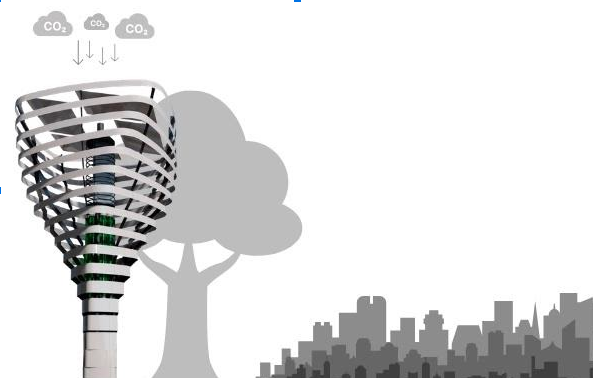The fight against climate change demands innovative solutions and microalgae has emerged as a powerful ally, helping to absorb CO2 at an unprecendented rate.
Microalgae function like tiny cellular factories, with an impressive ability to convert CO2 from the atmosphere into biomass through photosynthesis. Compared to land plants, they can fix CO2 10-50 times faster, making them superstars in carbon capture. Unlike trees that take years to mature, microalgae reproduce in mere hours. This rapid growth allows them to quickly absorb and store significant amounts of CO2.
Why is carbon capture so important?
The urgency for solutions is undeniable. The UN estimates we need to cut carbon emissions by 7.6% annually to stay below a critical 1.5°C temperature rise. Carbon capture offers a crucial tool alongside the transition to renewable energy sources.
The biological capture and sequestration of carbon using microalgae has gained recognition as one of the world’s most important and effective carbon sequestration methods (Moreira and Pires, 2016; Alami et al., 2021). In the long run, this bio-capture approach using microalgae is considered environmentally friendly, economically feasible, and a sustainable technology (Basu et al., 2014).

Figure 1. Global fossil emissions: (a) trends billion metric tons of CO2 from 1990 to 2020 (Boden et al., 2017) and (b) emissions from several economic sectors (EPA, 2021).
Biomitech, is tackling urban air pollution with a revolutionary technology called BioUrban. It is pioneering technology that absorbs carbon from the atmosphere and mitigates global warming. These 4-meter-high carbon sinks are capable of cleaning the air that 2,790 people breathe every day, or 40 tons of CO2 per year.
Here’s what makes BioUrban so innovative:
Power of Microalgae: Inside BioUrban’s structure lies the secret weapon – microalgae reactors. These microscopic organisms act like tiny filters, capturing polluting particles and using them as fuel for photosynthesis. Through this natural process, they convert pollutants into clean oxygen and biomass.
Targeted Impact: BioUrban is designed specifically for urban environments, acting as an add-on solution to amplify the air-purifying effects of existing trees. Unlike traditional trees that may struggle to thrive in densely packed city centers, BioUrban can be strategically placed in areas with high pollution levels, such as parks, schools, hospitals and of course industries. It’s important to remember that BioUrban is not a replacement for forests or natural trees, but rather a tool to significantly improve air quality in places where there’s limited space for trees and a pressing need for immediate climate action.
Maximizing Capture: BioUrban boasts impressive cleaning power. A single unit can remove the CO2 equivalent of what 2,790 people breathe daily, translating to a significant 40 tons of CO2 captured per year. This targeted approach allows for maximized CO2 capture in areas that need it most.

BioUrban represents a significant step towards cleaner cities. While established initiatives like urban forests play a crucial role, BioUrban, as Francisco Benedito, CEO of ClimateTrade, points out, offers a complementary solution. This innovative technology tackles pollution in areas where traditional methods are impractical, particularly within dense urban environments. This nature-based solution, unveiled during Miami Art Week in 2022, paves the way for a future with cleaner air and a more sustainable future.
At ClimateTrade, we believe that organizations have a crucial role to play in combating climate change, not only by reducing their current emissions (decarbonization) but also by actively removing existing CO2 from the atmosphere (offsetting) to mitigate their future impact. Companies like Biomitech, with their innovative BioUrban technology, are demonstrating how businesses can actively contribute to a cleaner future. BioUrban’s microalgae-powered “trees’ ‘ directly address air pollution in the built environment, capturing CO2 and offsetting emissions, making them a valuable tool for companies striving for a more sustainable footprint. ClimateTrade is proud to be the official distributor of BioUrban in Europe, making this revolutionary technology accessible to a wider audience.
What’s next for Biomitech? The BioUrban technology for industries.
We are excited to share that Biomitech is making waves in the industrial sector with their innovative new high-impact biofilter. Building on the success of their microalgae technology that tackles emissions, this new product takes a targeted approach. Instead of capturing air pollution from a general area, the high-impact biofilter integrates directly with specific industrial machines. This on-site filtration system utilizes microalgae to absorb emissions at the source, significantly reducing a facility’s overall environmental footprint.








